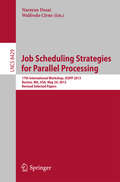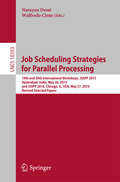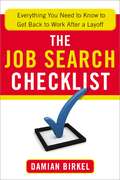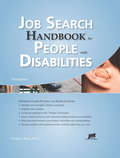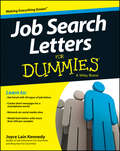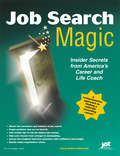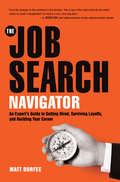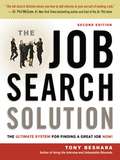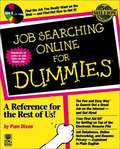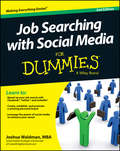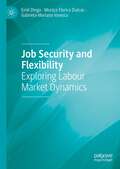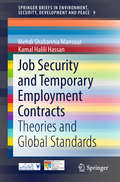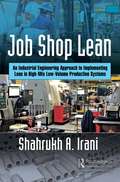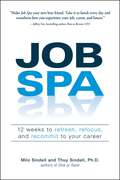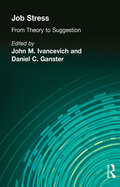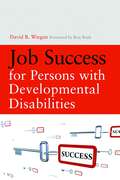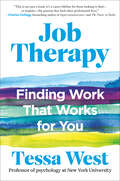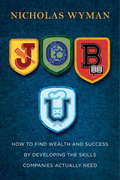- Table View
- List View
Job Satisfaction: From Assessment to Intervention
by Paul E. SpectorDistilling the vast literature on this most frequently studied variable in organizational behavior, Paul E. Spector provides students and professionals with a pithy overview of the research and application of job satisfaction. In addition to discussing the nature of and techniques for assessing job satisfaction, this text summarizes the findings regarding how people feel toward work, including cultural and gender differences in job satisfaction, personal and organizational antecedents, potential consequences, and interventions to improve job satisfaction. Students, researchers, and practitioners will particularly appreciate the extensive list of references and the Job Satisfaction Survey included in the Appendix. This book includes the latest research and new topics including the business case for job satisfaction, customer service, disabled workers, leadership, mental health, organizational climate, virtual work, and work-family issues. Further, paulspector.com features an ongoing series of blog articles, links to assessments mentioned in the book, and other resources on job satisfaction to coincide with this text. This book is ideal for professionals, researchers, and undergraduate and graduate students in industrial and organizational psychology and organizational behavior, as well as in specialized courses on job attitudes or job satisfaction..
Job Satisfaction: From Assessment to Intervention
by Paul E. SpectorDistilling the vast literature on this most frequently studied variable in organizational behavior, Paul E. Spector provides students and professionals with a pithy overview of the research and application of job satisfaction. In addition to discussing the nature of and techniques for assessing job satisfaction, this text summarizes the findings regarding how people feel toward work, including cultural and gender differences in job satisfaction, personal and organizational antecedents, potential consequences, and interventions to improve job satisfaction. Students, researchers, and practitioners will particularly appreciate the extensive list of references and the Job Satisfaction Survey included in the Appendix. This book includes the latest research and new topics including the business case for job satisfaction, customer service, disabled workers, leadership, mental health, organizational climate, virtual work, and work-family issues. Further, paulspector.com features an ongoing series of blog articles, links to assessments mentioned in the book, and other resources on job satisfaction to coincide with this text. This book is ideal for professionals, researchers, and undergraduate and graduate students in industrial and organizational psychology and organizational behavior, as well as in specialized courses on job attitudes or job satisfaction..
Job Scheduling Strategies for Parallel Processing
by Narayan Desai Walfredo CirneThis book constitutes the thoroughly refereed post-conference proceedings of the 18th International Workshop on Job Scheduling Strategies for Parallel Processing, JSSPP 2014, held in Phoenix, AZ, USA, in May 2014. The 9 revised full papers presented were carefully reviewed and selected from 24 submissions. The papers cover the following topics: single-core parallelism; moving to distributed-memory, larger-scale systems, scheduling fairness; and parallel job scheduling.
Job Scheduling Strategies for Parallel Processing
by Narayan Desai Walfredo CirneThis book constitutes the thoroughly refereed post-conference proceedings of the 18th International Workshop on Job Scheduling Strategies for Parallel Processing, JSSPP 2014, held in Phoenix, AZ, USA, in May 2014. The 9 revised full papers presented were carefully reviewed and selected from 24 submissions. The papers cover the following topics: single-core parallelism; moving to distributed-memory, larger-scale systems, scheduling fairness; and parallel job scheduling.
Job Sculpting: The Art of Retaining Your Best People
by Timothy Butler James WaldroopHiring good people is tough, but keeping them can be even tougher. The professionals streaming out of today's MBA programs are so well educated and achievement oriented that they could do well in virtually any job. But will they stay? According to noted career experts Timothy Butler and James Waldroop, only if their jobs fit their deeply embedded life interests--that is, their long-held, emotionally driven passions. Butler and Waldroop identify the eight different life interests of people drawn to business careers and introduce the concept of job sculpting, the art of matching people to jobs that resonate with the activities that make them truly happy. Managers don't need special training to job sculpt, but they do need to listen more carefully when employees describe what they like and dislike about their jobs. Once managers and employees have discussed deeply embedded life interests--ideally, during employee performance reviews--they can work together to customize future work assignments. In some cases, that may mean simply adding another assignment to existing responsibilities. In other cases, it may require moving that employee to a new position altogether. Skills can be stretched in many directions, but if they are not going in the right direction--one that is congruent with deeply embedded life interests--employees are at risk of becoming dissatisfied and uncommitted. And in an economy where a company's most important asset is the knowledge, energy, and loyalty of its people, that's a large risk to take.
The Job Search Checklist: Everything You Need to Know to Get Back to Work After a Layoff
by Damian Birkel<p>Losing your job can be a crushing setback, but the key is to remember the expression: "When one door closes, another one opens." With the proven tips and tactics featured in <i>The Job Search Checklist</i>, you'll learn how to turn your loss into opportunity and find another job fast. This indispensable guide covers everything from dealing with the emotional impact of being laid off to rebuilding your professional identity. You'll get solid advice on: <p> <li>Developing a career plan by taking stock of your experience, abilities, and goals <li>Crafting an effective résumé and building Internet-friendly documents <li>Creating a "personal marketing plan" to promote yourself to potential employers <li>Finding the hidden job market through in-person and online networking </li> <p> <p>Downloadable templates, sample cover letters, a range of effective résumé formats, and even job search correspondence will help you customize your efforts. Helpful checklists throughout the book will get you on the right track and keep you there. You'll also discover valuable strategies for interviewing and negotiating effectively, plus tips on hitting the ground running once you start that new--and better--job.</p>
Job Search Handbook for People with Disabilities: A Complete Career Planning and Job Search Guide (Third Edition)
by Daniel J. Ryan<p>This extensive handbook shows people with disabilities how to overcome obstacles they encounter when searching for employment. Readers learn how to identify their strengths, explore career options, and navigate the hidden job market. They also gain tips for writing resumes, cover letters, and other forms of job search communication, as well as guidance for performing well in interviews. <p><i>Job Search Handbook for People with Disabilities</i> features helpful information on employment laws and the rights they provide. It teaches readers when and how to disclose disabilities to a potential employer and lends additional guidance for success on the job.</p>
Job Search Letters For Dummies
by KennedyNew-style job messages that get you in the door and on your way upFrom sparkling cover letters to six-word bios, a fresh bevy of job search letters has grown powerfully useful for successful career communications. Job Search Letters For Dummies delivers the quality of New Era know-how you need right now to land good jobs and thrive. Whether you're a long-time professional or a recent college graduate -- or somewhere in between -- Job Search Letters For Dummies has you covered.Job Search Letters For Dummies covers the gamut of leading-edge topics, including effective strategies for internal career communications on topics such as raises, promotions, and position changes; rules for communicating professionally with texts and networking on social media platforms such as twitter and LinkedIn; fresh and updated communication phrases to voice accomplishments and make job-fit statements; post-interview etiquette and letters such as thank-yous, "hire me" reinforcement notes, interest revival queries; and much more.Get hired with 40 types of job lettersCreate short messages for a smartphone worldNetwork on social media sitesModel best letters more than 200 pro samplesWhether you're a long-time professional or a recent college graduate -- or somewhere in between -- Job Search Letters For Dummies has you covered.A note to job seekers from nationally syndicated careers columnist and author or Job Search Letters For Dummies, Joyce Lain Kennedy:Welcome aboard, job seekers! Thanks for checking out this first guide to communications-supported job search and career growth in relentlessly changing technological times. The right messaging -- what you say, why you say it, and when you say it -- is as important today to your employment goals as it has been at any time since Leonardo da Vinci wrote the first professional resume in 1482. Consider recent job-finding history:In 1986 fax machines and postal mail were the most popular ways to send resumes and cover letters.In the 1990s the Internet boom kicked in with new tools to connect jobs and people: e-mail, websites, cell phones, mailing lists, and online bulletin boards.In the 21st century the double-time march of recruiting technology skyrocketed, building a techno-swamp populated with endless ideas of how to connect work and people through smartphones, wonder tablets, apps, and social media for virtual networking. You're competing in a new world of work out there. If your job search is treading water -- or even drowning-- there's a better way. Make a splash! Engage hiring authorities through a communications-centered campaign with smart content.
Job Search Magic
by Susan Britton WhitcombIncludes sample resumes and cover letters, before-and-after interview responses, career-choice guidance, helpful job search Web sites, salary-negotiation tips, job success tips, and much, much more!
The Job Search Navigator: An Expert's Guide To Getting Hired, Surviving Layoffs, And Building Your Career
by Matt Durfee William N. CookeThe Job Search Navigator is a comprehensive guide to finding a new job in today's evolving career marketplace. Author Matt Durfee writes from the perspective of someone who has both recruited for some of America's biggest companies and navigated his way through nine of his own job losses. The book combines practical real-world perspectives with the technical knowledge job seekers need in order to excel at every aspect of their searches. Drawing on the knowledge Durfee accumulated through his own experiences, searches, and big-brand corporate hiring responsibilities, The Job Search Navigator abandons the "clinical approach" of many other career-advice books. Instead, Durfee gives easy-to-follow strategies and, perhaps more importantly, recounts in illuminating detail the kinds of mistakes that led him to develop these strategies. Despite recent reports of soaring corporate profits and gross domestic product growth, the effects of the Great Recession are still very real to the nearly 20 million Americans who are either jobless or underemployed. In these uncertain times, The Job Search Navigator is a reliable guide to every step of the 21st-century job hunt, whether readers are laid off, wanting to change careers after surviving cutbacks, or seeking a better full-time gig in a stagnant marketplace.
The Job Search Solution: The Ultimate System for Finding a Great Job Now! (Second Edition)
by Tony Beshara<p>When Dr. Phil's viewers need help turning their job search woes into employment success, he calls in Tony Beshara. One of the most successful placement professionals in the United States, Beshara knows what works and what doesn't. In <i>The Job Search Solution</i>, he outlines the simple yet powerful system that has helped over 100,000 people land jobs they love. Now, in a completely updated second edition, Beshara addresses the major challenges that confront candidates seeking employment today, including advice for readers who have been out of work for a while, were fired from their last job, are looking to change careers, or may be facing discrimination due to age. <p>Featuring interactive exercises, real-life examples, practical Do's and Don'ts, and other essential tools, the new edition reveals how candidates can create a personal "brand" online, communicate with potential employers via e-mail, and leverage personal stories throughout the interview process. Both practical and empowering, <i>The Job Search Solution</i> gives readers the tools they need to get hired in one of the toughest job markets ever.</p>
Job Searching Online for Dummies
by Pam DixonReady for a job that's perfect for you? Before you pound the pavement, surf the Net. More than just a list of Web sites, Job Searching Online for Dummies explains how to scope out potential employers on the Internet, network online, create and send an electronic resume that really stands out, design your own self-promoting Web site, and get that ideal job. Inside, find helpful advice on how to: *Conduct a well-informed job search using online resources *Build an electronic resume that best presents your skills *Post and send your e-resume and cover letter successfully *Network effectively in cyberspace - and make contacts with peers and employers *Create a dynamic Web page that really markets your talents *Tour the top job databases and check out corporate culture online *Keep your job search confidential and your personal information private.
Job Searching with Social Media For Dummies
by WaldmanHarness social media to land your dream jobFor anyone looking for a first job, exploring a career change, or just setting up for future success, social media sites are proven platforms for facilitating connections, demonstrating passions and interests, and ultimately landing the job. Job Searching with Social Media For Dummies enables you to harness the power of the Internet to research and identify job opportunities, and then create a strategy for securing a position.Job Searching with Social Media For Dummies features in-depth coverage of topics such as: creating effective online profiles and resumes to sell your strengths; maintaining your online reputation and understanding electronic etiquette; using the power of personal branding and building your brand online; avoiding common pitfalls, such as jumping into filling out a social media profile without a strategy; getting to know Twitter, the only real-time job board with literally thousands of jobs posted daily; using social media sites to uncover opportunities in the "hidden job market" ahead of the competition; and much more.Takes the mystery out of Facebook, Twitter, and LinkedInOffers advice on how to brand yourself onlineIncludes coverage of the latest changes to social platforms and websitesIf you're a recent graduate, changing careers, or have been away from the job-search scene for a while, turn to the trusted guidance and expert insight of Job Searching with Social Media For Dummies.
Job Security and Flexibility: Exploring Labour Market Dynamics
by Emil Dinga Monica Florica Dutcas Gabriela-Mariana IonescuThis book examines the relationship between job security and job flexibility. Through an innovative conceptual approach, the concept of job flexicurity is presented to highlight the labour market dynamics between job flexibility and employee security. The dynamics of labour market mechanisms are placed within ideas of rigidity, security, flexibility, and plasticity to explore the interplay between different employee considerations. Particular attention is given to the Romanian labour market with an empirical case study that expands upon the ideas discussed.This book aims to analyse how job security and flexibility impact worker well-being and happiness. It will be relevant to students and researchers interested in labour economics and the job market.
Job Security and Temporary Employment Contracts: Theories and Global Standards (SpringerBriefs in Environment, Security, Development and Peace #9)
by Mehdi Shabannia Mansour Kamal Halili HassanThis book discusses the need of a legal protection at national and global levels to address the use of temporary employment contracts by employers. Chapter 1 reviews some theories of job security, showing how job security issues should be regulated in labour laws to protect workers and also how temporary contracts affect job security. Chapter 2 examines legal protection of job security in temporary contract in international contexts where it examines the concept and need for job security and job protection especially for temporary contracts based on three United Nations’ instruments, namely, the Universal Declaration of Human Rights (UDHR), International Covenant on Civil and Political Rights (ICCPR), and International Covenant on Economic, Social and Cultural Rights (ICESCR). Chapter 3 studies the ILO standards in relation to job security and temporary contracts as well as those covered by the Philadelphia Declaration and other conventions and recommendations. Chapter 4 discusses Islamic jurisprudence on jobs and job security. The main aims of this chapter is to provide the framework for protecting workers as a means to enhance job security in the world especially in Islam. It discusses Islamic jurisprudence concerning work and job conditions. The Islamic precept is based on the Qur’an and Hadith and these sources are used to explain the concept of jobs in Islam. In addition, this chapter also examines the Cairo Declaration on Human Rights in Islam (CDHRI).
Job Shop Lean: An Industrial Engineering Approach to Implementing Lean in High-Mix Low-Volume Production Systems
by Shahrukh A. IraniIn the 1950’s, the design and implementation of the Toyota Production System (TPS) within Toyota had begun. In the 1960’s, Group Technology (GT) and Cellular Manufacturing (CM) were used by Serck Audco Valves, a high-mix low-volume (HMLV) manufacturer in the United Kingdom, to guide enterprise-wide transformation. In 1996, the publication of the book Lean Thinking introduced the entire world to Lean. Job Shop Lean integrates Lean with GT and CM by using the five Principles of Lean to guide its implementation: (1) identify value, (2) map the value stream, (3) create flow, (4) establish pull, and (5) seek perfection. Unfortunately, the tools typically used to implement the Principles of Lean are incapable of solving the three Industrial Engineering problems that HMLV manufacturers face when implementing Lean: (1) finding the product families in a product mix with hundreds of different products, (2) designing a flexible factory layout that "fits" hundreds of different product routings, and (3) scheduling a multi-product multi-machine production system subject to finite capacity constraints. Based on the Author’s 20+ years of learning, teaching, researching, and implementing Job Shop Lean since 1999, this book Describes the concepts, tools, software, implementation methodology, and barriers to successful implementation of Lean in HMLV production systems Utilizes Production Flow Analysis instead of Value Stream Mapping to eliminate waste in different levels of any HMLV manufacturing enterprise Solves the three Industrial Engineering problems that were mentioned earlier using software like PFAST (Production Flow Analysis and Simplification Toolkit), Sgetti and Schedlyzer Explains how the one-at-a-time implementation of manufacturing cells constitutes a long-term strategy for Continuous Improvement Explains how product families and manufacturing cells are the basis for implementing flexible automation, machine monitoring, virtual cells, Manufacturing Execution Systems, and other elements of Industry 4.0 Teaches a new method, Value Network Mapping, to visualize large multi-product multi-machine production systems whose Value Streams share many processes Includes real success stories of Job Shop Lean implementation in a variety of production systems such as a forge shop, a machine shop, a fabrication facility and a shipping department Encourages any HMLV manufacturer planning to implement Job Shop Lean to leverage the co-curricular and extracurricular programs of an Industrial Engineering department
Job Skills and Minority Youth
by Barton J. HirschMinority youth unemployment is an enduring economic and social concern. This book evaluates two new initiatives for minority high school students that seek to cultivate marketable job skills. The first is an after-school program that provides experiences similar to apprenticeships, and the second emphasizes new approaches to improving job interview performance. The evaluation research has several distinct strengths. It involves a randomized controlled trial, uncommon in assessments of this issue and age group. Marketable job skills are assessed through a mock job interview developed for this research and administered by experienced human resource professionals. Mixed methods are utilized, with qualitative data shedding light on what actually happens inside the programs, and a developmental science approach situating the findings in terms of adolescent development. Beneficial for policy makers and practitioners as well as scholars, Job Skills and Minority Youth focuses on identifying the most promising tactics and addressing likely implementation issues.
Job Spa: 12 Weeks to Refresh, Refocus, and Recommit to Your Career
by Milo SindellDoes your boss ignore you?Is your career going nowhere?Are you just going through the motions?If so, you need a trip to the Job Spa. Inside, authors Milo Sindell and Thuy Sindell detail an easy-to-master program that shows you how to reengage with your work and approach your career with new levels of energy and enthusiasm. Doing so will enable you to:Make a 100 percent commitment to get the most from your jobLeverage your strengths to achieve their professional goalsConquer workplace cultureGain the respect of your boss and colleaguesBuild valuable relationships in the workplaceJob Spa: Twelve Weeks to Refresh, Refocus, and Recommit to Your Career is all you need to get excited, get noticed, and get ahead-once and for all.
Job Spa
by Milo Sindell Thuy SindellDoes your boss ignore you? Is your career going nowhere? Are you just going through the motions? If so, you need a trip to the Job Spa. Inside, authors Milo Sindell and Thuy Sindell detail an easy-to-master program that shows you how to reengage with your work and approach your career with new levels of energy and enthusiasm. Doing so will enable you to: Make a 100 percent commitment to get the most from your job Leverage your strengths to achieve their professional goals Conquer workplace culture Gain the respect of your boss and colleagues Build valuable relationships in the workplaceJob Spa: Twelve Weeks to Refresh, Refocus, and Recommit to Your Career is all you need to get excited, get noticed, and get ahead-once and for all. Milo Sindell, M.S., has developed career training and employee integration programs for disabled adults. He has held senior management positions with Applied Signal, Intel, and Sun Microsystems. He lives in San Francisco.Thuy Sindell, Ph.D. is director for client services and a leadership coach for Mariposa Leadership, Inc., providing coaching services for Fortune 100 companies. Recent clients have included Charles Schwab, Cisco, The Gap, and Wells Fargo. She lives in San Francisco.They are the authors of Sink or Swim: New Job. New Boss. 12 Weeks to Get It Right.
Job Spa
by Milo Sindell Thuy SindellDoes your boss ignore you? Is your career going nowhere? Are you just going through the motions? If so, you need a trip to the Job Spa. Inside, authors Milo Sindell and Thuy Sindell detail an easy-to-master program that shows you how to reengage with your work and approach your career with new levels of energy and enthusiasm. Doing so will enable you to: Make a 100 percent commitment to get the most from your job Leverage your strengths to achieve their professional goals Conquer workplace culture Gain the respect of your boss and colleagues Build valuable relationships in the workplace Job Spa: Twelve Weeks to Refresh, Refocus, and Recommit to Your Careeris all you need to get excited, get noticed, and get ahead-once and for all. Milo Sindell, M. S. , has developed career training and employee integration programs for disabled adults. He has held senior management positions with Applied Signal, Intel, and Sun Microsystems. He lives in San Francisco. Thuy Sindell, Ph. D. is director for client services and a leadership coach for Mariposa Leadership, Inc. , providing coaching services for Fortune 100 companies. Recent clients have included Charles Schwab, Cisco, The Gap, and Wells Fargo. She lives in San Francisco. They are the authors ofSink or Swim: New Job. New Boss. 12 Weeks to Get It Right.
Job Stress: From Theory to Suggestion (Research In Occupational Stress And Well-being Ser.)
by John M Ivancevich Daniel C GansterLeading theorists and researchers explore the concept of stress in this relevant and well-timed volume. Physicians, psychologists, sociologists, and social psychologists who have been engaged in stress-related projects offer exciting and practical suggestions for applying organizational behavior management principles to the problem of stress. They share timely discussions on the causes and implications of job stress, which affects all levels of employees in business and industrial settings. This stimulating volume addresses the major theoretical perspectives and interpretations of job stress--from the diverse fields of medicine, clinical psychology, engineering psychology, and organizational psychology and proposes stress measurement and stress management interventions. A fascinating review of the empirical research on stress indicates the present state of study on the subject and emphasizes the need for more applied research using OBM principles. There is currently a great deal of disagreement about the meaning of job stress, its effects on people and organizations, and strategies for coping with the phenomenon. The effects of stress on individuals and organizations are thoroughly explored in this timely volume.
Job Success for Persons with Developmental Disabilities
by David B. Wiegan<p>In the United States alone, there are roughly three million individuals living with a developmental disability, but less than a third are active in the labor market. This book provides a comprehensive approach to developing a successful jobs program for persons with developmental disabilities, drawn from the author's extensive experience and real success. <p>The majority of persons with developmental disabilities are unemployed, underemployed, or still work in sheltered programs where it is almost impossible to reach their full potential. Job success is possible, but it requires a system based on a business model based on proven economics, rather than the traditional social services model. By employing a step-by-step procedure for gaining insight into the client, analyzing market opportunities, matching the client to a job, and supporting the client after placement, service providers can help individuals make a successful transition into good community-based employment. <p><i>Job Success for Persons with Developmental Disabilities</i> will be essential reading for profit and non-profit rehabilitation service organizations, private job development businesses, government funding agencies, special education job placement programs, transition specialists, and families of persons with developmental disabilities.</p>
Job Therapy: Finding Work That Works for You
by Tessa WestA psychologist&’s guide to finding your most fulfilling job yetWhen we&’re unhappy in our jobs, we often attribute our frustration to a bad manager, boring tasks, and stressful workloads. But our dissatisfaction at work usually stems from a deeper psychological need that&’s not being met at work, like not getting the recognition you deserve.In Job Therapy, Dr. Tessa West helps you figure out the real reason you&’re unhappy and shows you how to find a new position in which you&’ll thrive, whether in a different role, company, or new industry altogether. Through her research interviewing thousands of people who have recently switched jobs or undergone career changes, she found there are five common sources of career frustration: having an identity crisis – does your sense of self no longer match your job?you&’ve drifted-apart – do you no longer recognize the job you once loved? you&’re torn between places – are you taking on too many roles at work, switching tasks too often, or stuck between two paths?you&’re the runner up – do you always feel like you keep coming in second? you&’re the underappreciated star – are you crushing it at work, but the people around you aren&’t recognizing your performance? Dr. West will guide you through a working week audit to help identify your unique psychological stressors and use that knowledge to understand what you want your future career to look like. Presenting cutting-edge insights on networking and hiring, from Dr. West&’s interviews with over 1,500 professional recruiters, Job Therapy will help you land your best role yet – one that guarantees happiness for years to come.
Job U
by Nicholas WymanGet ready to relearn everything you thought you knew about what a successful career path can look like. Today, unemployment hovers at a near-record high, yet 3.5 million American jobs remain unfilled. Why? Because companies simply cannot find people with the skills they actually need.The good news is that this skills gap represents unprecedented opportunities for every person seeking a successful and exciting career. But these opportunities can't be found inside the walls of the traditional classroom. Instead, they lie in the myriad of educational options that provide the technical, vocational, and soft skills on demand in today's workplace, such as: -Professional certifications: Start your career faster in fields like bioscience aviation, culinary arts, and medical technology. -Associates degrees: Increase earning potential through inexpensive 2-year programs in subjects like civil engineering, environmental science, education, and nursing.-Apprenticeships: Earn while you learn under the direct supervision of a skilled expert. Far beyond the artisan trades, today's apprenticeships can be found at companies like Volkswagen and Siemens.-Occupational learning: Refresh or reboot your skill sets through on-the-job training or online education. In Job U, you'll learn about these paths to rewarding occupations; where to find them and how to parlay them into the best paying job in any field. And along the way, you'll meet individuals of all ages who have attained their "dream jobs" through a non-traditional education: from an emergency air paramedic, to a lead mechanic of a racecar team, to an engineer of complex gas turbine generators, to a bestselling cookbook author. Whether you are recent high school or college graduate, or well along in your career journey, Job U will help you find your way to a more secure and prosperous future.From the Trade Paperback edition.
Jobinterviews professionell führen
by Christof Obermann Marc SolgaEine äußerst hilfreiche und fundierte Lektüre für erfolgreiche Einstellungsinterviews und professionelle Kandidatenauswahl. Führungskräfte und Personaler erhalten hier das Handwerkszeug, um Auswahlinterviews aussagekräftig zu gestalten und so zu treffsicheren und zuverlässigen Auswahlentscheidungen zu gelangen. Unnötige zeitliche und finanzielle Belastungen, die durch falsche Einstellungsentscheidungen entstehen, lassen sich hierdurch vermeiden. Den Kern des Praxishandbuches bilden rund 400 Interviewfragen zu 65 unterschiedlichen Kompetenzen. Führungskräfte und Personaler erhalten für fast alle Berufe valide Interviewfragen, die sie direkt in Auswahlgesprächen verwenden können.

